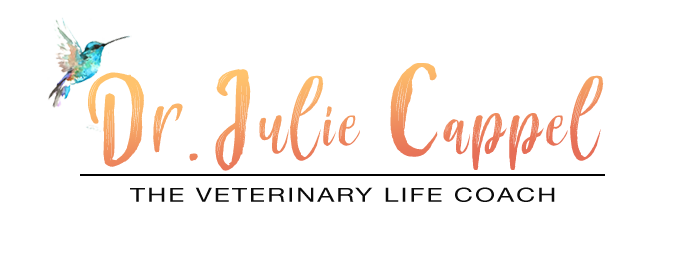These past few years were
big for me; I changed my career in a significant way. I didn’t give up veterinary medicine -- no --
I am still and always will be a practicing veterinarian. I did add some new
skills to my bag of veterinary tricks. I
took and completed a course in life coaching and became certified as a life coach. I began chasing this dream about five years ago,
so completing it in 2019 was a big accomplishment.
I have always studied
leadership and have enjoyed working with people on problem solving. Working as a hospital owner for over 20 years,
I found many opportunities to be a leader and help others lead, but I saw a
need in our veterinary community for someone to coach veterinarians through the
struggle of stress, anxiety, and burnout.
I developed a blog, podcast and several presentations focused on helping
veterinary professionals.
 I have presented at various
veterinary meetings and joined a life coaching school that taught me the skills
to help veterinarians understand their brains, and provided them the skills to
manage their minds around the challenges that we all face. It has been a joyous,
often difficult, and worthwhile journey.
Coaching veterinarians is amazing, and I love helping people discover
themselves and challenge their status quo.
I have presented at various
veterinary meetings and joined a life coaching school that taught me the skills
to help veterinarians understand their brains, and provided them the skills to
manage their minds around the challenges that we all face. It has been a joyous,
often difficult, and worthwhile journey.
Coaching veterinarians is amazing, and I love helping people discover
themselves and challenge their status quo.
Did you know that people
laugh when you tell them you are a life coach? Why did I choose to face my fear
of ridicule and doubt from my peers? Why
do it?
Stepping out of your
comfort zone will open doors for you.
Each new skill or experience will build on the last, and things that you
never thought possible will start to happen for you. You will meet new people that may help you reach
the next step on your journey and open you up for the next opportunity. Staying comfortable and living small will
feel good in the moment, but will keep you from new experiences and interesting
encounters. My coaching has led me to so many interesting people and experiences.
Stepping out of your
comfort zone will sharpen your existing skills.
If you embrace the lessons that others teach you, the skills that you
previously had will evolve and improve.
When I listen to another doctor in my practice tell me about something that
they learned at a continuing education event, I open myself up to the possibility
of learning a better way. My skills will
be improved because I am not afraid to try to do something differently. I
become a better veterinarian because I stepped out of my comfort zone.
Stepping out of your
comfort zone will make you a better person.
When you start to challenge yourself, you will begin to awaken parts of
you that you never knew existed. You will
discover that you have many strengths that you never knew you possessed. It is much easier to keep control over the
known things in your life by living small; however, stepping into a new
experience will open you up to opportunities and discoveries about your strengths
and weaknesses. Trying new things allows
you to understand yourself better and builds character.
So, try something new this
year that scares you a little. Try to
stretch and challenge yourself in small ways.
The more you try it, the easier it will get. You will feel fear but push through the fear
and work towards growth. You will
discover things about yourself that you previously did not know and become a
more authentic you. You may just help others
in the process.
Julie Cappel
“There are no great limits
to growth because there are no limits of human intelligence, imagination, and
wonder.” - Ronald Reagan





